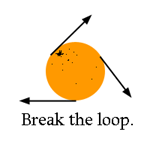

 | Tangentium |
All material on this site remains © the original authors: please see our submission guidelines for more information. If no author is shown material is © Drew Whitworth. For any reproduction beyond fair dealing, permission must be sought: e-mail drew@comp.leeds.ac.uk. ISSN number: 1746-4757 |
Feature essay: IT Education and Democratic PracticeDrew Whitworth, University of LeedsPage 1 ¦ Page 2 ¦ Page 3 ¦ Page 4 ¦ Printer-friendly version Is it possible to revive possibilities for autonomous, democratic applications of IT in preference to the standardised, "office skills" approach? This is vital if Dearing's previously-quoted hope for education (producing citizens who can contribute to a genuinely democratic society) is to be fulfilled. The first aim should be to break an emphasis on mere access to information through IT. Access is important, but if it becomes the only thing which matters, IT will turn into little more than a glorified television system, used to transmit information (in the most trivial sense) to the passive masses. A 1999 paper from the Cabinet Office, Modernising Government, significantly demonstrates this (emphases added): "The information age should increase the choice of how citizens and businesses receive services, not restrict it.... We will develop targeted strategies to ensure that all groups have proper access to information age government." What, though, of the autonomous production of information, and the ability to criticise what one is given and debate it outside of the standard democratic channels (which nowadays have been reduced to little more than 12 votes in a lifetime)? A true public sphere is not passive, it is active. Information can and must be used in ways that might not necessarily accord with the wants and needs of the government or corporations who have the power and resources to control various forms of interaction. Combined with the need to address the failures of IT education at the individual level (see page 1), these suggest that a more rounded and potentially democratic approach to IT education would, alongside the "motor skills" [19], cover the following:
In short, IT education needs to move beyond being thought of as merely a "service" subject. It can and should be taught as an intellectual as well as a merely practical subject; and this applies at all levels of education. Neil Selwyn observes that changes such as this are not easy to achieve in practice [20]. It is true that this kind of knowledge is often absent from teachers as much as it is from their students, and programmes like this may therefore be required in teacher training as well. More significantly, there are immense pressures being placed on educators in all fields to orient their teaching towards efficient returns and/or the "needs of industry". Selwyn has a point, but there are two responses to his (mild) criticism. Firstly, it is in fact less cost-effective in the long term if students (or employees) are constantly having to re-learn new skills to cope with upgrades [21]. Nor will it help "industry" in the long term if many people enter its embrace with a deep feeling of alienation from IT or, at best, a disinclination to use it in creative ways. Selwyn himself has argued previously that students "must want to use IT (and perceive it as being of real utility) if they are going to develop an effective 'technological literacy' for the twenty-first century" [22]. It may therefore be that although returns on an investment in this form of IT education are more abstract, they are nevertheless still larger than from standardised models. Secondly, there is the danger of getting into a vicious circle here. Going only for the easy option is an abdication of responsibility on behalf of educators, and will exacerbate all the problems described in this paper. That something is more difficult is not alone a reason to dismiss it. What needs investigation are the reactions of students to this kind of teaching and the consequences of this alternative model (which skills have been acquired, which are kept longer than a few months after the course of teaching, which are used outside the workplace, and so on). These are long-term projects, but they are essential if we are to gain a full understanding of what IT education could and should be. Since humans first began communicating with their fellows, the information sphere has been developing. It has always been the task of educators to contribute to the continual production and reproduction of this sphere and of the various information domains which comprise it. If educators absolve all responsibility here to the market or government then the continued colonisation of the public sphere is inevitable. Exerting autonomy and encouraging people to think and act independently -- to become users of information rather than just passive consumers of it -- these have always been, and will remain, political acts. Return to the top of this page Footnotes19. Meaning the basic technicalities of IT; manipulating files, using office applications and so on. In no way do we suggest these should not be taught. Not only are they pragmatically useful for students; they also provide students with valuable experience of ways in which the computer may shape their work, rather than the other way around. Let it be stressed, therefore, that the suggestions in the text are of teaching elements which should lie alongside these motor skills, not replace them. [return]. 20. Selwyn, Neil (2003): "Why students do (and do not) make use of ICT in university", collected papers, Finding Common Ground: IT, Dearing and Democracy in the Information Society, conference at the University of Leeds, 9/7/03, p.19. [return] 21. Kotamraju, Nalini (1999): "The birth of web site design skills: making the present history", American Behavioral Scientist, 43/3, pp. 464-74. [return]. 22. Selwyn, Neil (1998): "What's in the Box? Exploring Learners' Rejection of Educational Computing", Educational Research and Evaluation 4/3, p. 209. [return]. | |